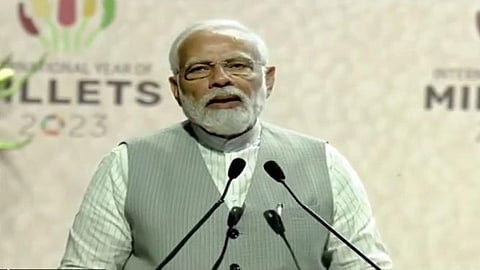

New Delhi | Prime Minister Narendra Modi on Saturday said millets can help tackle challenges of food security as well as food habits and asked farm scientists to work towards increasing the share of nutri-cereals in the national food basket.
Addressing the gathering after inaugurating the ‘Global Millets (Shri Anna) Conference', he said it is a matter of great honour for the country that after India's proposal and efforts, the United Nations declared 2023 as 'International Year of Millets'.
Modi said India is continuously working to promote millets or Shri Anna as a global movement.
Stressing that millets can be grown easily in adverse climatic conditions and without chemicals and fertilizers, the prime minister said India's millets mission will benefit 2.5 crore small and marginal farmers in the country.
"Today millets constitute only 5-6 per cent in the national food basket. I urge India's scientists and farm experts to work expeditiously to increase the share. We will have to set achievable targets for it," Modi said.
Stating that the government has launched a production linked incentive (PLI) scheme for the food processing sector, he asked companies to take advantage of the programme to increase production of millet-based products.
Recognising the importance of millets or nutri-cereals, and creating a domestic and global demand along with providing nutritious food to the people, India spearheaded the United Nations General Assembly (UNGA) resolution for declaring the year 2023 as International Year of Millets.
The proposal of India was supported by 72 countries, and UNGA declared 2023 as International Year of Millets in March 2021.
Millet is a common term to categorise small-seeded grasses that are often termed nutri-cereals or dryland-cereals and includes Sorghum (Jowar), Pearl Millet (Bajra), Finger Millet (Ragi), Little Millet (Kutki), Foxtail Millet (Kakun), Proso Millet (Cheena), Barnyard Millet (Sawa), Kodo Millet (Kodon) and other millets.
India produces more than 170 lakh tonne of millet, which is 80 per cent of Asia's and 20 per cent of global production. While the global average yield of millet is 1,229 kg/hectare, the yield in India is 1,239 kg/ha.
The prime minister also unveiled a customised postal stamp and Rs 75 currency coin on International Year of Millets (IYMI)-2023.
